It’s 5am on a Sunday, pitch black outside, with no hint of light. Mr Somboka, the accounting teacher at St Jude’s picks up his phone to turn off his alarm, the screen glowing on his face.
Most weekends, Mr Somboka volunteers his time, going into St Jude’s to help his students.
His morning routine involves having a shower before eating his breakfast and, as the sun rises, he begins looking over his notes. Mr Somboka likes to meticulously prepare his lessons, reading absolutely everything that he can find.
At about half past nine, he says good-bye to his wife and two children, before arriving at St Jude’s just before ten o’clock.
As Mr Somboka arrives at St Jude’s, he walks towards Room 10 of Block B where fourteen of his Form 6 students are waiting for him. Today’s focus will be going over their previous exam.
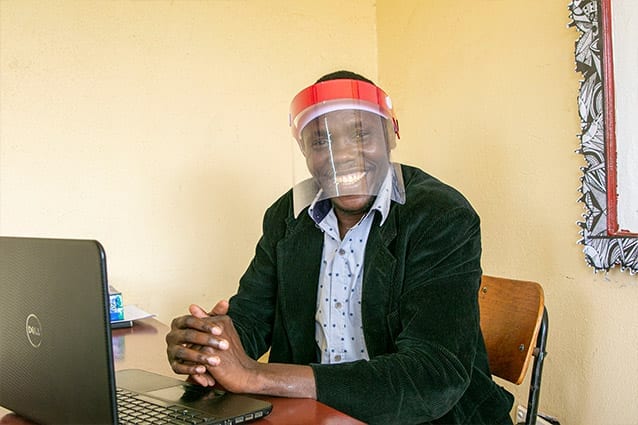
After arriving, students begin approaching Mr Somboka’s desk, he goes over each exam with them individually. Some of them come holding a letter which outlines what errors they made in the exam, and strategies they can use to improve. “After receiving the letters I sit with them one after another and we talk,” says Mr Somboka. “We find a way to solve a problem with each student.”
Last year, St Jude’s Form 6 accounting class made it into the top 10 schools in Tanzania and Mr Somboka identifies one key factor in this success.
“I came up with strategies on how students will love my subject,” he says. “Accounting is everywhere!”
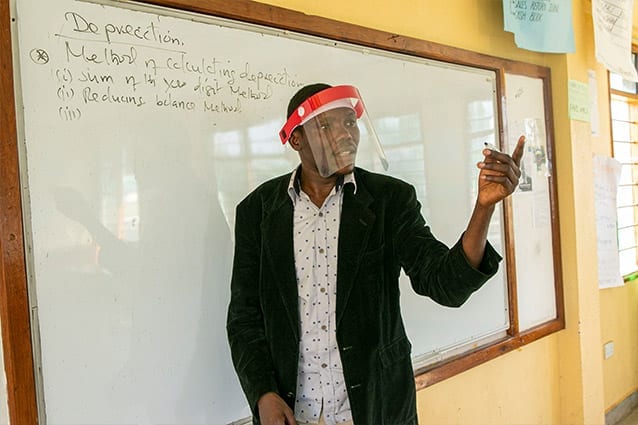
To connect with his students, Mr Somboka keeps his classes practical, relating the curriculum to the real world. “If a student’s dream is to be a business person I will ask them about managing their funds and turning a profit,” says Mr Somboka. “They’re the practical questions I ask my students.”
Mr Somboka is one of four children, his parents taught him the value of being patient and believing in yourself.
His family would work as a team, helping one another, in order to face their problems. This is an approach Mr Somboka has taken with him to St Jude’s.
“We do everything as a team, for each department,” says Mr Somboka. “If there’s a student failing a business subject, we as a department will meet and help that student." Teamwork and helping make up the spine of Mr Somboka’s teaching philosophy and are values that he passes onto his Form 6 students.
“I’m happy to see my students back in class after so long. My focus right now is to help the students cope after being home for over three months. Currently, the students are doing regional examinations and once that’s done, we will be going through all the past papers to prepare for the national examinations.”
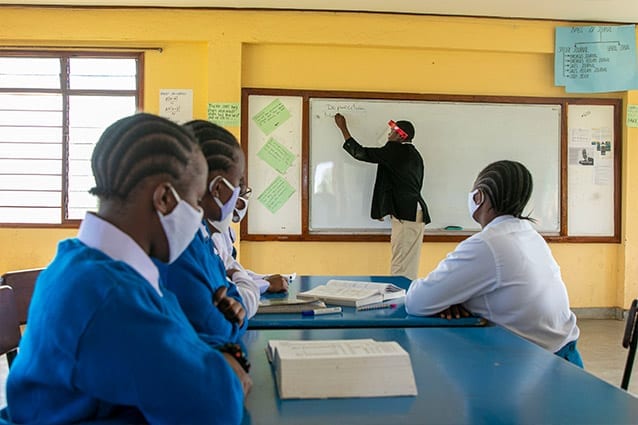
“I absolutely believe that this group of Form 6 students will make it into top 10 again because the students worked extra hard coming out of the coronavirus pandemic,” says Mr Somboka.
On some days, Mr Somboka will be sitting in his office and hear a knock at the door. The person standing at the door will be a student, seeking help on an upcoming exam or even seeking counselling on what they are going through outside of school.
“One of the problems students have involved parents who are divorced and they will be sitting in class thinking about their mum and dad,” says Mr Somboka. “I tell them that this is their parent’s problems, and it is up to them to find their own future.”
“Once they have found their own future, they can help their parents.” He added, “My advice to all students is to focus on their priorities. They should always live based on St Jude’s core values which are Respect, Responsibility, Honesty and Kindness.”
“What do you see here?” asks Ms Edina, nodding towards her desk, as the class settles into their seats.
“A pineapple,” says one of the students.
Indeed, standing proudly at the centre of Ms Edina’s desk is an enormous pineapple, the size of a leopard’s head. The pineapple is strategically placed, so it can be seen from any point in the room.
“So, why did I start painting and drawing?” Ms Edina, an art teacher, ponders to the class. “Well, let me tell you a story.”
She starts to explain that when she was five years old she used to play a game called ‘Baba mdogo’ which means uncle in Swahili. Participants sit in a circle and sing a song, afterwards one person in the circle will name an object, anything they like, and the entire circle is given one minute to draw it. Whenever it was Ms Edina’s turn she would only ever name one thing – a pineapple.
Once Ms Edina began drawing, she couldn’t stop. Sometimes, she would even draw pineapples on the walls inside her family home, landing her in trouble with her parents.
“Now, today, as my students, I want you to draw a pineapple too!” says Ms Edina.Only, on this occasion, students will not be drawing on walls, instead being given blank sheets of paper
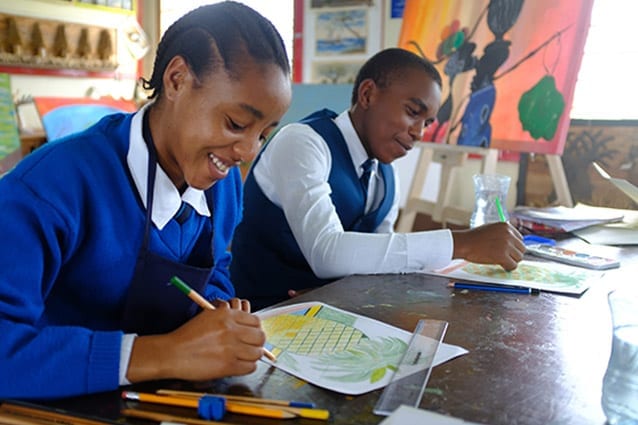
“I don’t want you to draw the pineapple exactly as it is,” Ms Edina adds. “I want you to improvise, I want you to use any colour you like, and I want you to use detail.”
“You have one hour!” The students begin rummaging around the classroom; picking up pencils, paintbrushes and anything else they can find. She then lists the principles of art as the students get to work.
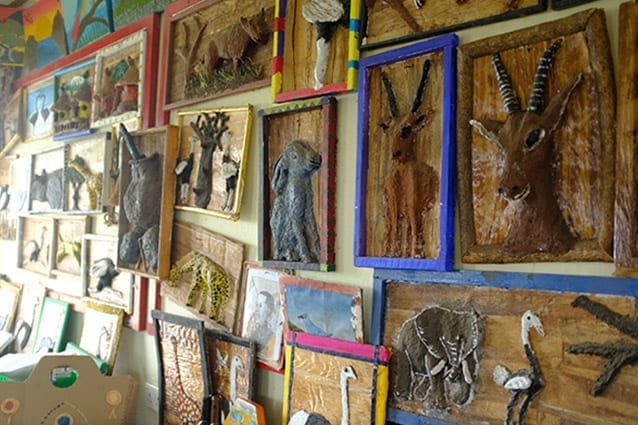
The art room offers serenity for the students, tucked away in a corner of the secondary campus, at the top of several flights of stairs. There is no conventional door to enter the art room, instead you brush through beaded curtains, a nod to the idea that the art room is always open. Inside, there are beautiful panoramic views of Mount Meru on one side, and rolling foothills on the other.
“So, what did you all draw when you were little?” asks Ms Edina to the class, as she works on her own pineapple.
“Cars!” “Dogs!” “Flowers!” “Potatoes!” students cry out.
The last response causes a stir amongst the students, and the class begin to exchange stories from their childhood. At 27 years of age, Ms Edina is one of the youngest teachers at St Jude’s and enjoys an easy rapport with her students.
Two Form 6 students, Isaac and Lillian, involve themselves in Ms Edina’s art classes outside of their normal timetable, as art is not an A Level subject, but they still like to join in. “I’m always painting in my spare time,” says Isaac. “Madam Edina always supports us and she always challenges us to do more.”Lillian, who likes to draw whenever she is feeling stressed, agrees with Isaac. “Ms Edina never discourages us,” says Lillian. “She will always say, ‘you can do it!’”
During the school shutdown period due to the spread of COVID-19, Ms Edina continued to support her students in their art studies.
“When schools shutdown, I gave each of my students assignments and references for them to practise at home. Even though the schools were closed for over three months, the art packs that the students received proved to be helpful. I’ve seen a massive improvement in my student’s with some coming back with fresh ideas.”
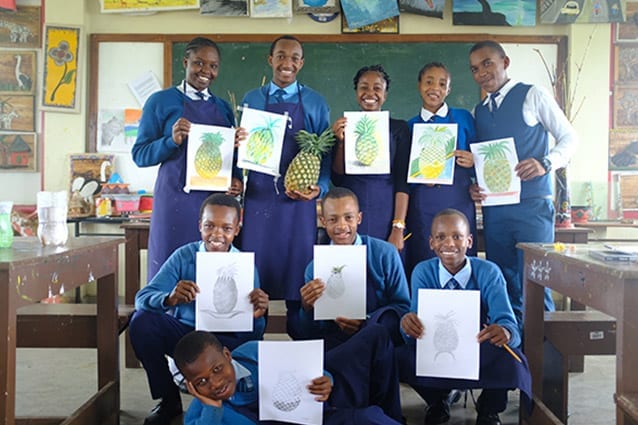
However, with the introduction of an adjusted academic calendar, Ms Edina added, “currently it is tough for the students to make time to practise their art. But I do advise them to spare at least 30 minutes a day to brush up their craft.”
Flomena and her family live in a two-room mud house, nestled beside a creek on the outskirts of Arusha city.
Her mother, Agape, works on a farm, while her father, Aloyce, works as a security guard at a local convent. However, their combined income is not enough to provide for their three children.
Flomena was selected to join The School of St Jude in 2017 as a new Standard 1 student, when she, along with hundreds of others that year, applied for an academic scholarship.
Flomena passed the initial academic tests with flying colours, and when our staff conducted a poverty assessment of her home, it was clear that Flomena’s family deserved an opportunity for their intellectually gifted child to receive a scholarship to St Jude’s.
Already, the family’s life is starting to improve.

“Because we do not have to pay school fees for Flomena, we have saved a little money to buy some more chickens. Flomena is starting to speak English well and she can teach us, too,” said Aloyce.
He also shared an exciting dream that may come to fruition in the near future.
“We have finally saved enough and bought some [cement] blocks to start building a better house soon,” said Aloyce.

Moving out of a mud or wooden house and into a more solid dwelling is merely a pipeline goal for many Tanzanians. It is difficult for disadvantaged families to save funds to purchase simple building supplies, when more pressing concerns, such as feeding children, paying school fees and supporting frail relatives, take priority.
On top of all this, it can take many years in Tanzania for a small home to be built to completion.
Azael, Standard 3, and his family, understand this all too well. Like Flomena, Azael lives in a house made of mud and sticks. Thanks to the support his family receives from St Jude’s, they have made a start on building a house made of bricks, right next to their current home.

It’s a huge step up in terms of security and sustainability for years to come. Azael’s mother, Ester, beamed with pride as she explained what St Jude’s support means to her.
“I have have been able to buy a small calf that is growing. Little by little, we are building a new house made of bricks. We can save money, we are very grateful,” she expressed.
“The big changes I have seen in Azael, is that he is able to speak English very well. It is a very big change because before [attending] St Jude’s, he could only speak Kiswahili. This change will help him in his future,” Ester added.

Year by year, your support of our students’ education makes a much bigger impact. While it empowers poor, bright students, it also gifts families with the tools they need to lift themselves out of poverty.
Flomena and Azael’s families, quite literally, are building foundations for a brighter future… because of you.
When Zahra, Standard 6, danced her way out of the school gates on Uniform Day in 2015, she knew she had received a precious gift.
“I remember my first day, I was so happy, my Mama was crying. We knew this was my golden chance to have a good future,” she explained.
“Because of St Jude’s, I have learnt new skills and learnt about entrepreneurship. I can reach my dream of becoming an entrepreneur one day. It will be good to own a business in Tanzania, my big dream is to be a leader,” Zahra smiled.
Zahra is the only child in her family. Her father earns a small wage driving a motorcycle taxi. Her mother was previously employed as a house-maid, but due to the COVID-19 pandemic, has been stood down from work.
“Life has been tougher since coronavirus started. When Mama lost her job I was scared, because some of our needs cannot be met. Only Baba (father) is working now.”
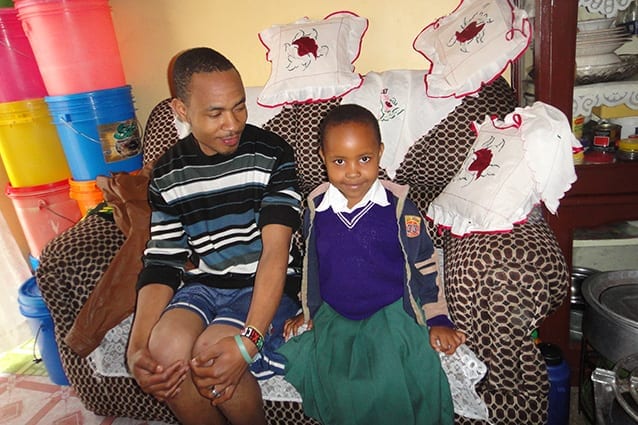
Although the impact of COVID-19 presents challenges for students, particularly while schools remain closed, St Jude’s families have expressed heartfelt gratitude for additional support.
“We were so happy and thankful to the school. Mama was smiling a lot. The school did not forget us,” Zahra shared.
When asked what she loves most about attending St Jude’s, Zahra paused and, giggling, tipped her head towards the rainbow-coloured play equipment.
“I love everything. My dreams can come true.”

Christopher, also in Standard 6, echoes Zahra’s expression.
Christopher lives in a small mud house on the outskirts of Arusha City, with both parents and one younger sister.
“One of the best things I can do is help my family at home using what I learn at St Jude’s,” Christopher said.
Christopher’s mother earns a small living as a tailor, while his father works on construction sites. Like Zahra’s parents, their incomes have been compromised due to COVID-19.
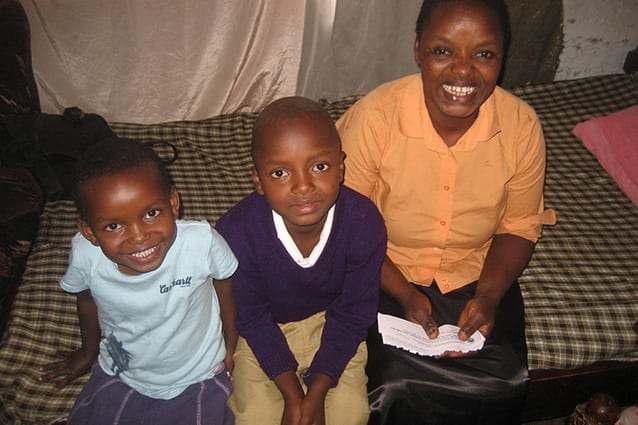
“Not many people are leaving the house to bring Mama things to sew. As for my father, he is only working four hours per day, not full days. I feel bad for the situation, but at least the corona pack [COVID-19 Family Care Package] helped us,” he expressed.
Christopher dreams to be a doctor so that he can help protect Tanzanians against infectious diseases.
Because of you, Christopher is well on the way to reaching that goal.
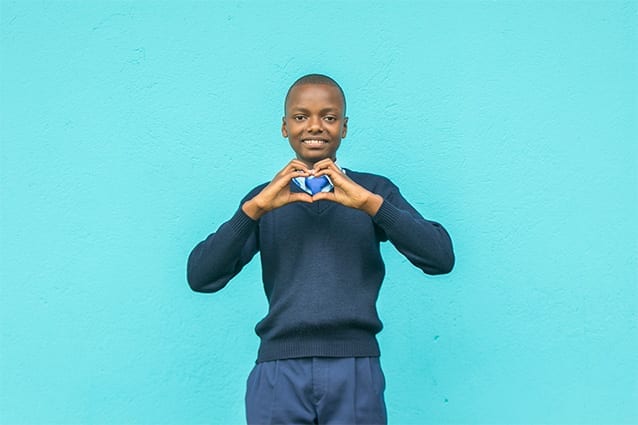
“Before St Jude’s, I used to go to government school. Here [at St Jude’s], I can take school buses. We eat good lunch. My sponsors sometimes send presents, they really help my family. My parents are happy because they know I am safe at school.”
The final week of April, 2020 made history for The School of St Jude. It was a week that taught us the true tenacity of our school community. It taught us that, in times of crisis, there’s nothing more important than lending a hand. It reminded us the value of our fiercely loyal supporters.
Ironically, even though we cannot be physically close during the COVID-19 pandemic, we’ve never felt more connected. We have you to thank for that.
When, Founding Director, Gemma Sisia, launched a mini-appeal to raise funds for COVID-19 Family Care Packages, she couldn’t have prepared for the solidarity expressed by our sponsors and donors.
The idea to assemble packages came to Gemma when a government decree was issued, declaring indefinite closure of schools.

“I’ve always said, ‘St Jude’s has the best supporters in the whole world!’” Gemma commented.
“Yet again, they’ve proven this true. Even though many of them are suffering, they’ve still been willing to help us address the pandemic,” she added.
Within a week of the idea’s inception, the vast majority of staff were on the task, assembling 2,000 COVID-19 Family Care Packages. The packs contain staple foods: rice, maize and beans. They also contain soap, bleach, sanitiser and instructions on how to make a mask at home. Individual home study packs and exercise books were included, too.

Each of our students and Community Service Year (CSY) interns received a package, which provides additional means for our families to protect themselves against COVID-19.
In our greatest operation of ‘divide and conquer’, staff and CSY interns criss-crossed Northern Tanzania over two days, distributing COVID-19 Family Care Packages along 29 school bus routes.
Each team returned with heartfelt stories of gratitude, humanity, and connection in a time of separation.

Head of Beyond St Jude’s, Vivian, told of a particularly moving moment that conveys the wonderful work of the school.
Vivian and her team boarded one of St Jude’s iconic buses in the early hours of the morning on Saturday 2nd May. Soon after, they pulled into a nearby, densely populated village to deliver packages to our families. The distribution team was greeted with grateful applause and cries of ‘Mungu akubariki’ – God bless you.
“I did not quite realise just how much this support was needed and appreciated by our families. It was a privilege to be able to offer a little extra help,” said Vivian.

For many people within Tanzania, maintaining social distance is challenging. Our poorest civilians rely on crowded public transport to travel to and from markets, selling produce from dawn to dusk, earning a minimal wage. This reality is uncomfortably close to home for the parents of our students, including Mama Nelson, who had a particular impact on Vivian.
“Mama Nelson’s child studies at Smith Secondary Campus. She sells dagaa (packaged, dry sardines) by the roadside. The family lives below the poverty line. When I passed her the package, tears filled her eyes,” Vivian shared.
Mama Nelson expressed sincere thanks to St Jude’s, in a profound exchange the distribution team will not soon forget.
“You cannot imagine how this is going to help me,” Mama Nelson expressed.
“I have been sending my children to sleep on a diet of maize porridge only for one week. Now, I can feed our family.”

Your continued support has not only ensured full stomachs, but full hearts. Closed borders have no bearing on the impact of St Jude’s international family, nor the inspiring example it sets for the world.
It’s eight o’clock in the morning and the air smells fresh from a night of rain. Outside the entrance of St Jude’s are dozens of eager families who’ve turned up hours early, waiting for the start of Uniform Day.
Some of the children, who will be studying in Standard 1 and 2 this year, have formed a conga line. Others cling to the hem of their mother’s dress. Newfound friendships that will last for years are already being made.
Over 1,000 hopeful applicants attended the selection day in July 2019 and today’s group of new students are the result of a rigorous process that helps ensure the limited places available go to those most in need and with the attitude and aptitude to make the most of this life-changing opportunity.
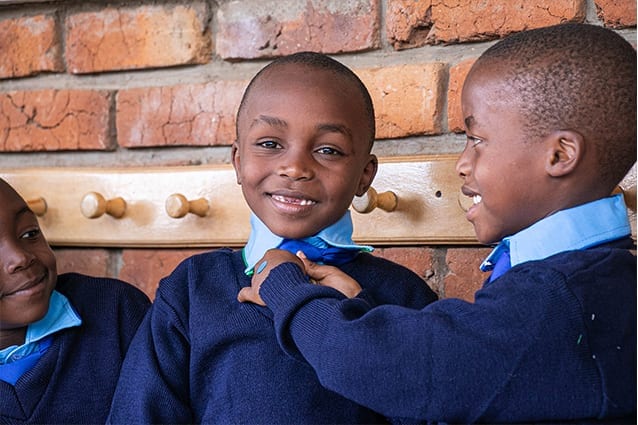
At nine o’clock the day commences. First stop, school photos. One girl named Fauzia decides to strike a pose. With one hand on her waist, the other raised in the air, she grins audaciously.
“That’s my girl!” calls Vivian, one of the staff members helping out, “We need girls with confidence!”
After photos, it’s time for the uniforms to be fitted.
While adults tend to walk from place to place, children often run. Today is a day of running. The students rush towards the main school building and up the stairs, plopping down on long wooden benches. One by one their names are called out and they have their uniform fitted. For many, this uniform is the first item of new clothing they’ve ever owned.
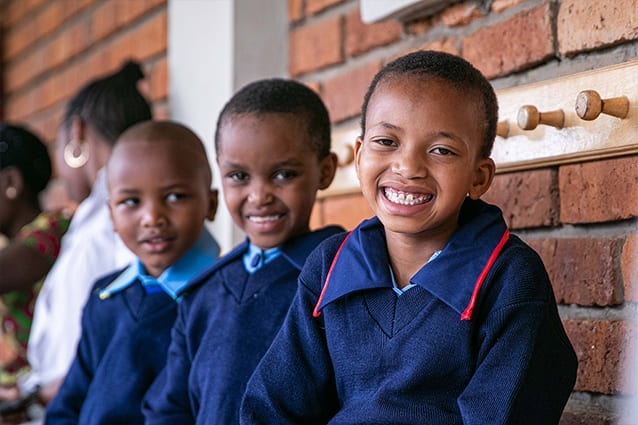
Arriving a little preoccupied is School Founder, Gemma Sisia. She’s had a sleepless night, with one of her pet dogs giving birth to five puppies in the early hours.
As she walks past the smiling new students, she suddenly stops, recognising a girl with short hair and a toothy smile.
“Lightness!” she says excitedly.
As part of the application process, St Jude’s staff members visit the home of future students. It was Gemma who completed Lightness’ poverty check. While looking through a family photo album, Gemma noticed that Lightness was squinting at all the photos. Lightness needed glasses but the family couldn’t afford to buy a pair. Yet, despite being visually impaired, Lightness was among the top two in her government school for academics. When Lightness starts at St Jude’s she’ll receive an annual health check by an international team of medical professionals and will soon have the glasses she needs to see properly.
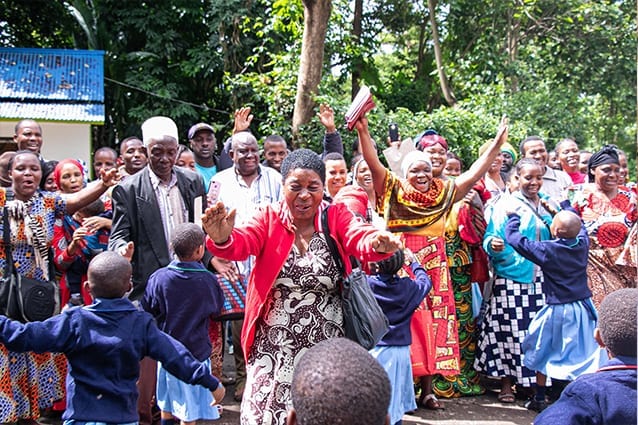
Sitting opposite Lightness, on a separate bench, is Fauzia, quietly waiting her turn. Out of the door strides Vivian. She crouches down in front of Fauzia, taking her hand.
“Fauzia – come with me!”
Vivian and Fauzia walk inside the room. Tables have been set that are creaking under the weight of newly stitched sky and navy-blue uniforms.
Fauzia begins trying on different dresses, finding her size. “What do you want to be when you grow up?” asks Vivian, watching on.
“A teacher,” says Fauzia. “
What subjects will you teach?” “
All the subjects.” “
That’s my girl!” laughs Vivian.
Once all the students have been fitted, a blue wave of students sprint toward their families to show off their new uniforms. A father picks up his son, placing him on his shoulders, bouncing up and down. A mother smothers her daughter with kisses. A grandmother buries her face in her hands, the moment too much. All the while a group of St Jude’s students have congregated, each of them armed with a drum and encouraging the children to dance.
Fauzia looks around and spots her teenage brother. The boy drops to one knee, welcoming his little sister into his arms
“This feels great,” her brother, Yassin says, looking down at his sister in her new uniform. “I’m lost for words, I’m just so happy!”
Support new students, like Fauzia, by sponsoring an academic scholarship today.